Sociological Analysis: Singapore's Nation-Building Concerns Today
VerifiedAdded on 2023/06/14
|5
|1537
|192
Essay
AI Summary
This essay critically examines Singapore's nation-building concerns and challenges by applying a sociological perspective and appreciating the country's historical journey. Based on the article "Singapore cannot afford to slow down," the analysis explores how Singapore developed, focusing on the concept of building a "Smart Nation" through prioritizing humans over technology, achieving enterprise efficacy via globalization and digital transformation, and addressing resource constraints by turning urban challenges into opportunities. The essay also delves into Singapore's founding myths, such as the lack of natural resources, and the transition from a non-nation to a sovereign state, highlighting the government's role in equipping citizens with skills, providing digital infrastructure, and investing in research and development to facilitate state and nation-building.
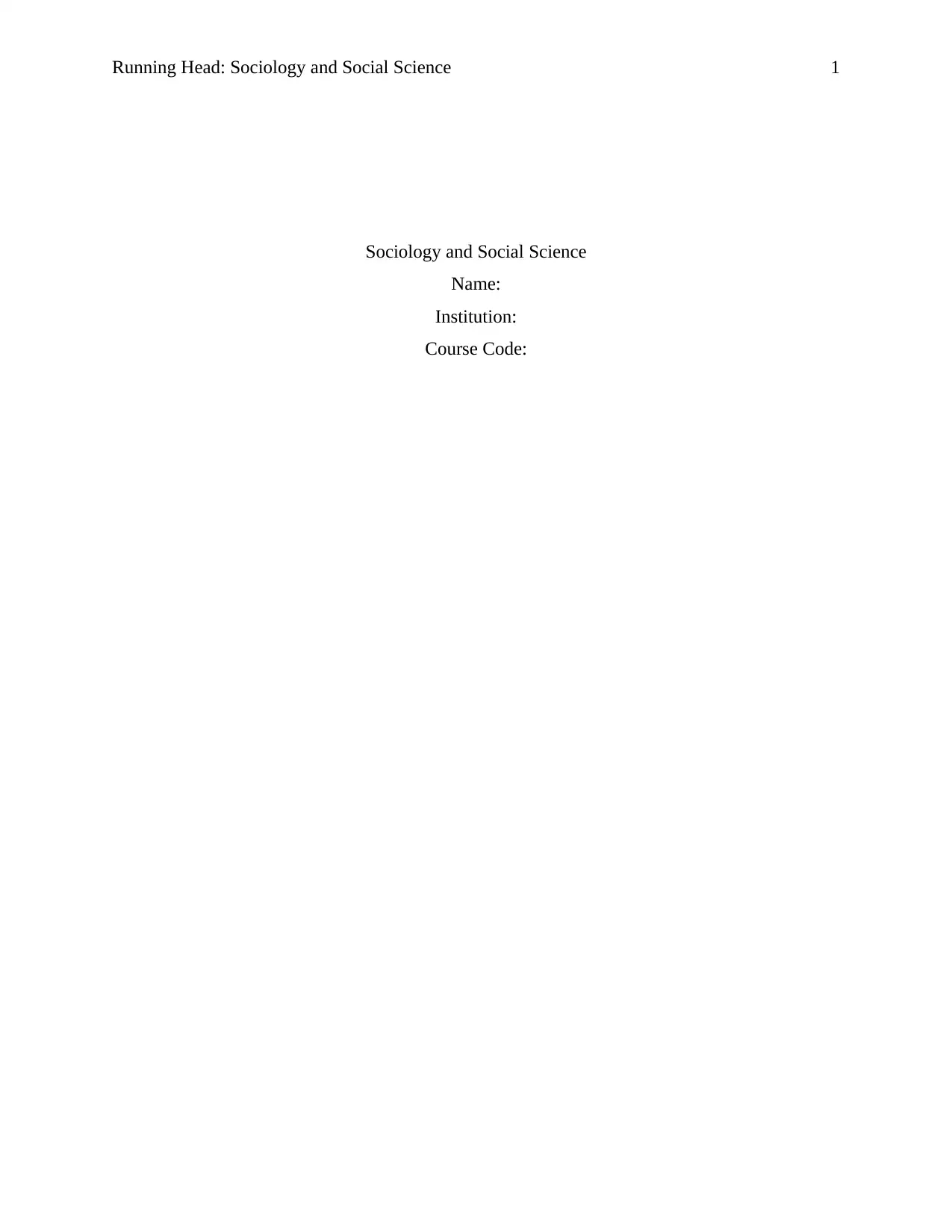
Running Head: Sociology and Social Science 1
Sociology and Social Science
Name:
Institution:
Course Code:
Sociology and Social Science
Name:
Institution:
Course Code:
Paraphrase This Document
Need a fresh take? Get an instant paraphrase of this document with our AI Paraphraser
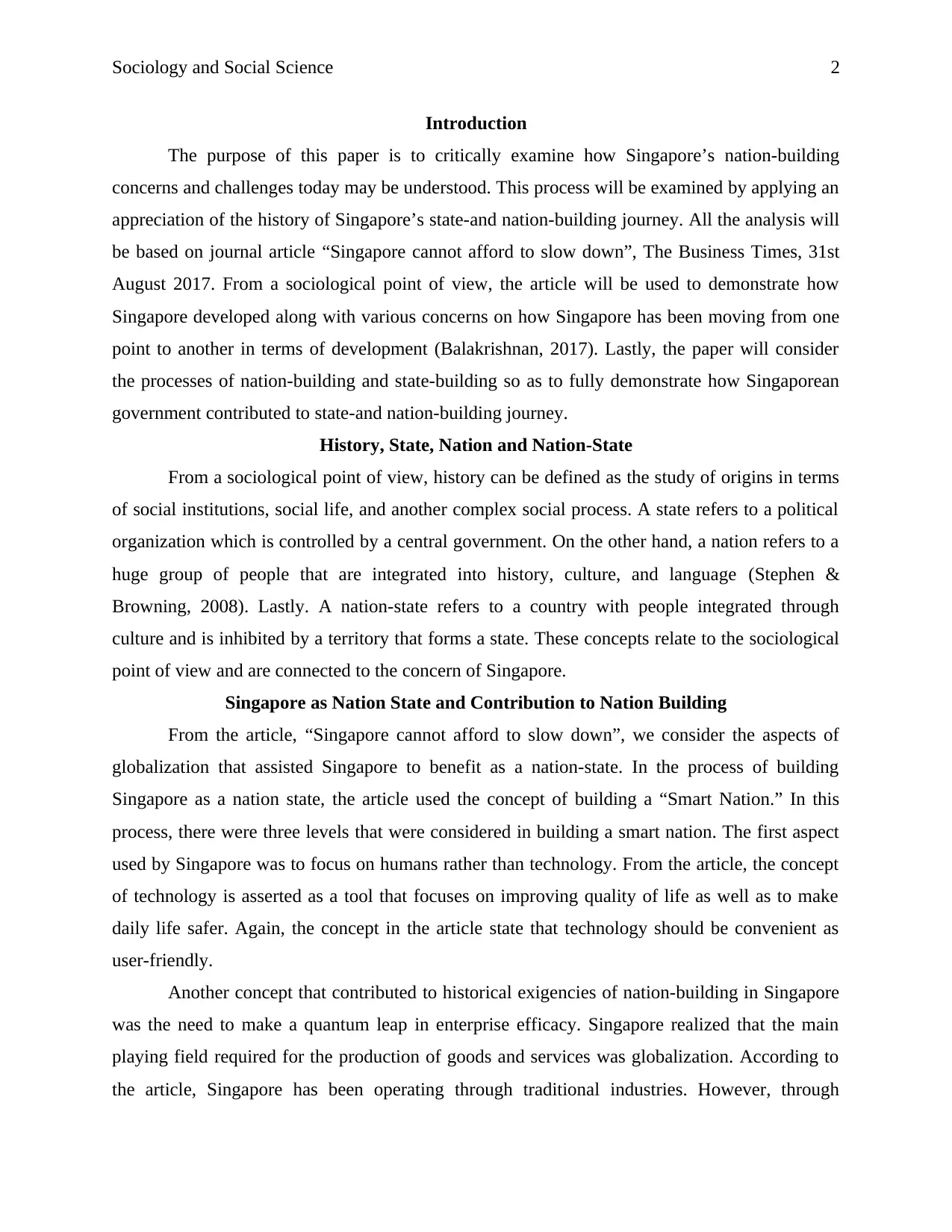
Sociology and Social Science 2
Introduction
The purpose of this paper is to critically examine how Singapore’s nation-building
concerns and challenges today may be understood. This process will be examined by applying an
appreciation of the history of Singapore’s state-and nation-building journey. All the analysis will
be based on journal article “Singapore cannot afford to slow down”, The Business Times, 31st
August 2017. From a sociological point of view, the article will be used to demonstrate how
Singapore developed along with various concerns on how Singapore has been moving from one
point to another in terms of development (Balakrishnan, 2017). Lastly, the paper will consider
the processes of nation-building and state-building so as to fully demonstrate how Singaporean
government contributed to state-and nation-building journey.
History, State, Nation and Nation-State
From a sociological point of view, history can be defined as the study of origins in terms
of social institutions, social life, and another complex social process. A state refers to a political
organization which is controlled by a central government. On the other hand, a nation refers to a
huge group of people that are integrated into history, culture, and language (Stephen &
Browning, 2008). Lastly. A nation-state refers to a country with people integrated through
culture and is inhibited by a territory that forms a state. These concepts relate to the sociological
point of view and are connected to the concern of Singapore.
Singapore as Nation State and Contribution to Nation Building
From the article, “Singapore cannot afford to slow down”, we consider the aspects of
globalization that assisted Singapore to benefit as a nation-state. In the process of building
Singapore as a nation state, the article used the concept of building a “Smart Nation.” In this
process, there were three levels that were considered in building a smart nation. The first aspect
used by Singapore was to focus on humans rather than technology. From the article, the concept
of technology is asserted as a tool that focuses on improving quality of life as well as to make
daily life safer. Again, the concept in the article state that technology should be convenient as
user-friendly.
Another concept that contributed to historical exigencies of nation-building in Singapore
was the need to make a quantum leap in enterprise efficacy. Singapore realized that the main
playing field required for the production of goods and services was globalization. According to
the article, Singapore has been operating through traditional industries. However, through
Introduction
The purpose of this paper is to critically examine how Singapore’s nation-building
concerns and challenges today may be understood. This process will be examined by applying an
appreciation of the history of Singapore’s state-and nation-building journey. All the analysis will
be based on journal article “Singapore cannot afford to slow down”, The Business Times, 31st
August 2017. From a sociological point of view, the article will be used to demonstrate how
Singapore developed along with various concerns on how Singapore has been moving from one
point to another in terms of development (Balakrishnan, 2017). Lastly, the paper will consider
the processes of nation-building and state-building so as to fully demonstrate how Singaporean
government contributed to state-and nation-building journey.
History, State, Nation and Nation-State
From a sociological point of view, history can be defined as the study of origins in terms
of social institutions, social life, and another complex social process. A state refers to a political
organization which is controlled by a central government. On the other hand, a nation refers to a
huge group of people that are integrated into history, culture, and language (Stephen &
Browning, 2008). Lastly. A nation-state refers to a country with people integrated through
culture and is inhibited by a territory that forms a state. These concepts relate to the sociological
point of view and are connected to the concern of Singapore.
Singapore as Nation State and Contribution to Nation Building
From the article, “Singapore cannot afford to slow down”, we consider the aspects of
globalization that assisted Singapore to benefit as a nation-state. In the process of building
Singapore as a nation state, the article used the concept of building a “Smart Nation.” In this
process, there were three levels that were considered in building a smart nation. The first aspect
used by Singapore was to focus on humans rather than technology. From the article, the concept
of technology is asserted as a tool that focuses on improving quality of life as well as to make
daily life safer. Again, the concept in the article state that technology should be convenient as
user-friendly.
Another concept that contributed to historical exigencies of nation-building in Singapore
was the need to make a quantum leap in enterprise efficacy. Singapore realized that the main
playing field required for the production of goods and services was globalization. According to
the article, Singapore has been operating through traditional industries. However, through
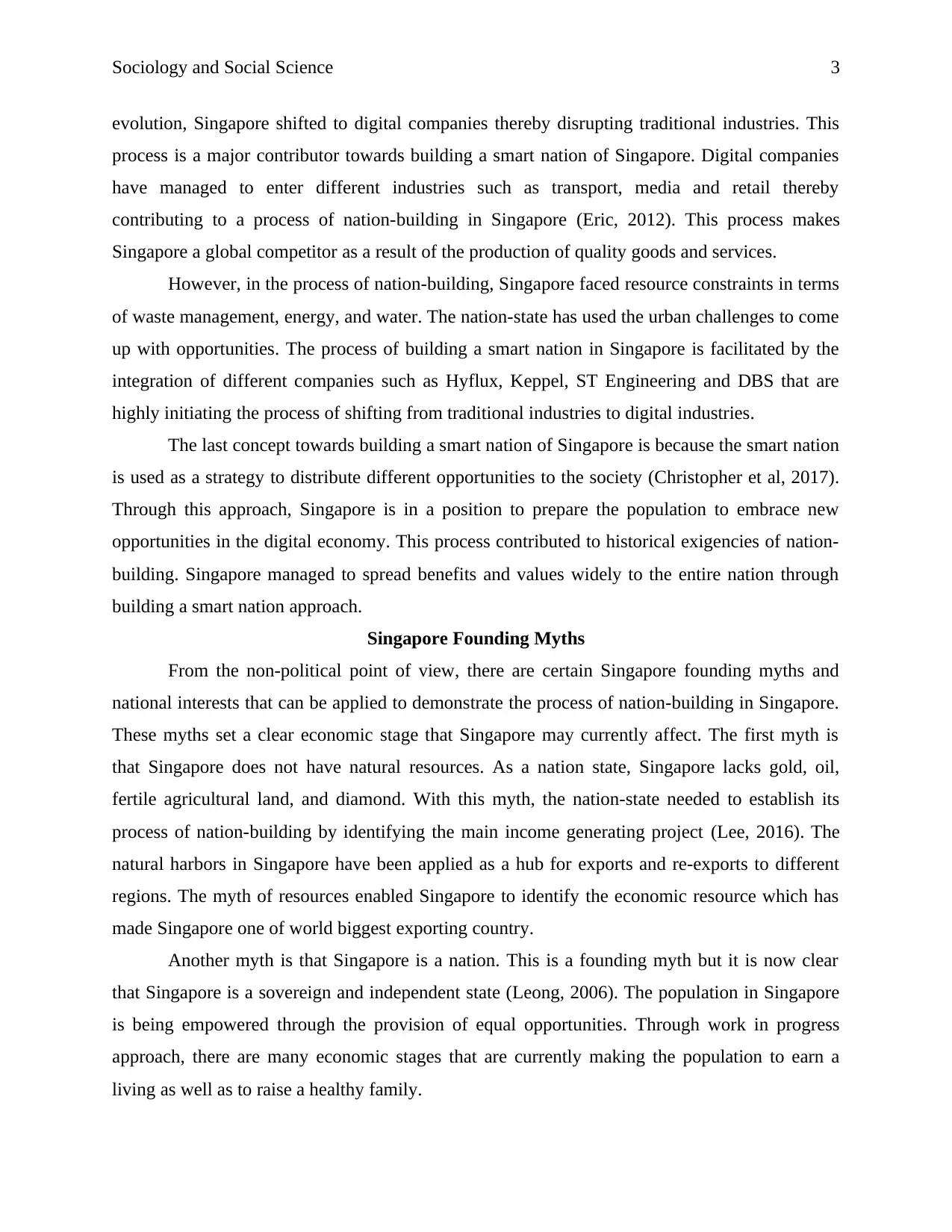
Sociology and Social Science 3
evolution, Singapore shifted to digital companies thereby disrupting traditional industries. This
process is a major contributor towards building a smart nation of Singapore. Digital companies
have managed to enter different industries such as transport, media and retail thereby
contributing to a process of nation-building in Singapore (Eric, 2012). This process makes
Singapore a global competitor as a result of the production of quality goods and services.
However, in the process of nation-building, Singapore faced resource constraints in terms
of waste management, energy, and water. The nation-state has used the urban challenges to come
up with opportunities. The process of building a smart nation in Singapore is facilitated by the
integration of different companies such as Hyflux, Keppel, ST Engineering and DBS that are
highly initiating the process of shifting from traditional industries to digital industries.
The last concept towards building a smart nation of Singapore is because the smart nation
is used as a strategy to distribute different opportunities to the society (Christopher et al, 2017).
Through this approach, Singapore is in a position to prepare the population to embrace new
opportunities in the digital economy. This process contributed to historical exigencies of nation-
building. Singapore managed to spread benefits and values widely to the entire nation through
building a smart nation approach.
Singapore Founding Myths
From the non-political point of view, there are certain Singapore founding myths and
national interests that can be applied to demonstrate the process of nation-building in Singapore.
These myths set a clear economic stage that Singapore may currently affect. The first myth is
that Singapore does not have natural resources. As a nation state, Singapore lacks gold, oil,
fertile agricultural land, and diamond. With this myth, the nation-state needed to establish its
process of nation-building by identifying the main income generating project (Lee, 2016). The
natural harbors in Singapore have been applied as a hub for exports and re-exports to different
regions. The myth of resources enabled Singapore to identify the economic resource which has
made Singapore one of world biggest exporting country.
Another myth is that Singapore is a nation. This is a founding myth but it is now clear
that Singapore is a sovereign and independent state (Leong, 2006). The population in Singapore
is being empowered through the provision of equal opportunities. Through work in progress
approach, there are many economic stages that are currently making the population to earn a
living as well as to raise a healthy family.
evolution, Singapore shifted to digital companies thereby disrupting traditional industries. This
process is a major contributor towards building a smart nation of Singapore. Digital companies
have managed to enter different industries such as transport, media and retail thereby
contributing to a process of nation-building in Singapore (Eric, 2012). This process makes
Singapore a global competitor as a result of the production of quality goods and services.
However, in the process of nation-building, Singapore faced resource constraints in terms
of waste management, energy, and water. The nation-state has used the urban challenges to come
up with opportunities. The process of building a smart nation in Singapore is facilitated by the
integration of different companies such as Hyflux, Keppel, ST Engineering and DBS that are
highly initiating the process of shifting from traditional industries to digital industries.
The last concept towards building a smart nation of Singapore is because the smart nation
is used as a strategy to distribute different opportunities to the society (Christopher et al, 2017).
Through this approach, Singapore is in a position to prepare the population to embrace new
opportunities in the digital economy. This process contributed to historical exigencies of nation-
building. Singapore managed to spread benefits and values widely to the entire nation through
building a smart nation approach.
Singapore Founding Myths
From the non-political point of view, there are certain Singapore founding myths and
national interests that can be applied to demonstrate the process of nation-building in Singapore.
These myths set a clear economic stage that Singapore may currently affect. The first myth is
that Singapore does not have natural resources. As a nation state, Singapore lacks gold, oil,
fertile agricultural land, and diamond. With this myth, the nation-state needed to establish its
process of nation-building by identifying the main income generating project (Lee, 2016). The
natural harbors in Singapore have been applied as a hub for exports and re-exports to different
regions. The myth of resources enabled Singapore to identify the economic resource which has
made Singapore one of world biggest exporting country.
Another myth is that Singapore is a nation. This is a founding myth but it is now clear
that Singapore is a sovereign and independent state (Leong, 2006). The population in Singapore
is being empowered through the provision of equal opportunities. Through work in progress
approach, there are many economic stages that are currently making the population to earn a
living as well as to raise a healthy family.
⊘ This is a preview!⊘
Do you want full access?
Subscribe today to unlock all pages.

Trusted by 1+ million students worldwide
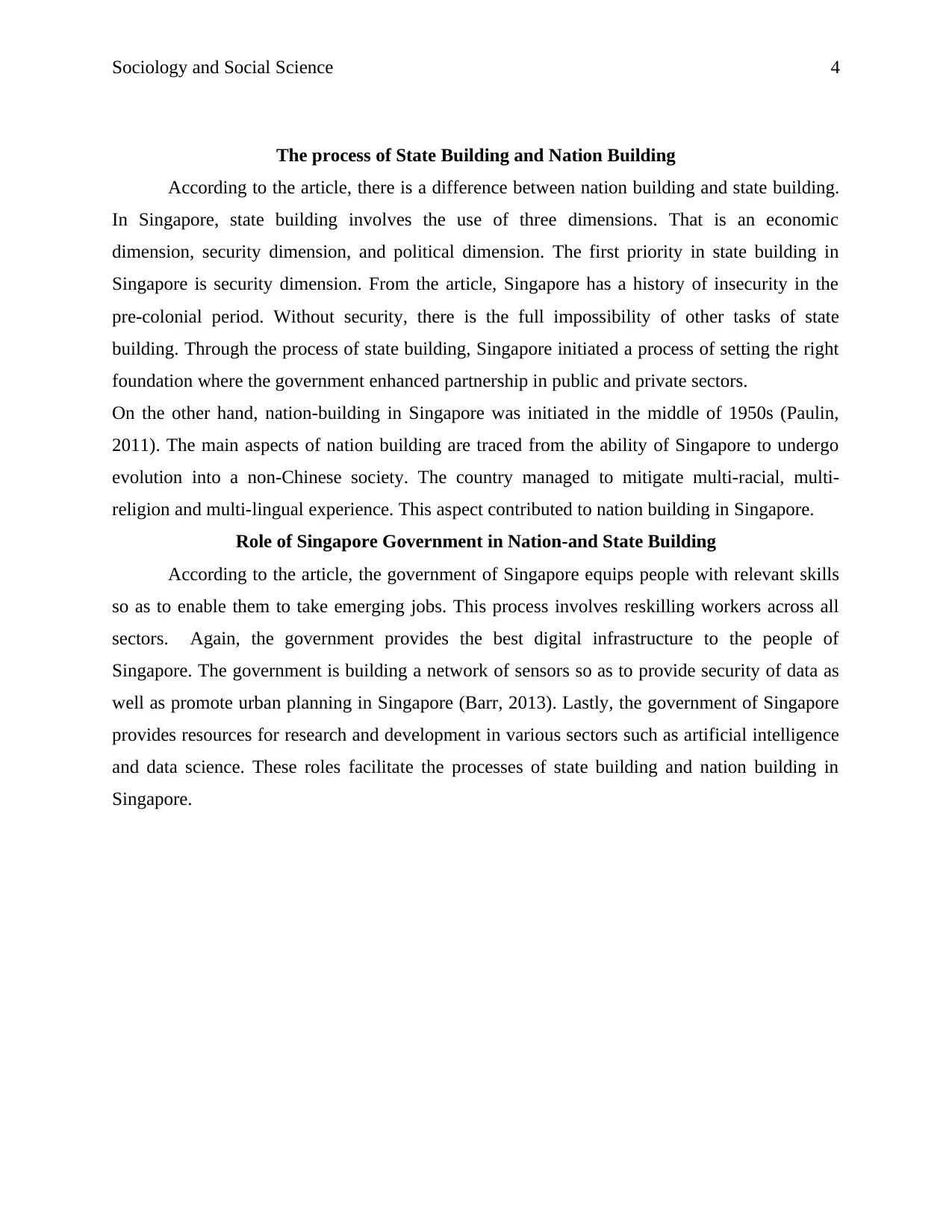
Sociology and Social Science 4
The process of State Building and Nation Building
According to the article, there is a difference between nation building and state building.
In Singapore, state building involves the use of three dimensions. That is an economic
dimension, security dimension, and political dimension. The first priority in state building in
Singapore is security dimension. From the article, Singapore has a history of insecurity in the
pre-colonial period. Without security, there is the full impossibility of other tasks of state
building. Through the process of state building, Singapore initiated a process of setting the right
foundation where the government enhanced partnership in public and private sectors.
On the other hand, nation-building in Singapore was initiated in the middle of 1950s (Paulin,
2011). The main aspects of nation building are traced from the ability of Singapore to undergo
evolution into a non-Chinese society. The country managed to mitigate multi-racial, multi-
religion and multi-lingual experience. This aspect contributed to nation building in Singapore.
Role of Singapore Government in Nation-and State Building
According to the article, the government of Singapore equips people with relevant skills
so as to enable them to take emerging jobs. This process involves reskilling workers across all
sectors. Again, the government provides the best digital infrastructure to the people of
Singapore. The government is building a network of sensors so as to provide security of data as
well as promote urban planning in Singapore (Barr, 2013). Lastly, the government of Singapore
provides resources for research and development in various sectors such as artificial intelligence
and data science. These roles facilitate the processes of state building and nation building in
Singapore.
The process of State Building and Nation Building
According to the article, there is a difference between nation building and state building.
In Singapore, state building involves the use of three dimensions. That is an economic
dimension, security dimension, and political dimension. The first priority in state building in
Singapore is security dimension. From the article, Singapore has a history of insecurity in the
pre-colonial period. Without security, there is the full impossibility of other tasks of state
building. Through the process of state building, Singapore initiated a process of setting the right
foundation where the government enhanced partnership in public and private sectors.
On the other hand, nation-building in Singapore was initiated in the middle of 1950s (Paulin,
2011). The main aspects of nation building are traced from the ability of Singapore to undergo
evolution into a non-Chinese society. The country managed to mitigate multi-racial, multi-
religion and multi-lingual experience. This aspect contributed to nation building in Singapore.
Role of Singapore Government in Nation-and State Building
According to the article, the government of Singapore equips people with relevant skills
so as to enable them to take emerging jobs. This process involves reskilling workers across all
sectors. Again, the government provides the best digital infrastructure to the people of
Singapore. The government is building a network of sensors so as to provide security of data as
well as promote urban planning in Singapore (Barr, 2013). Lastly, the government of Singapore
provides resources for research and development in various sectors such as artificial intelligence
and data science. These roles facilitate the processes of state building and nation building in
Singapore.
Paraphrase This Document
Need a fresh take? Get an instant paraphrase of this document with our AI Paraphraser
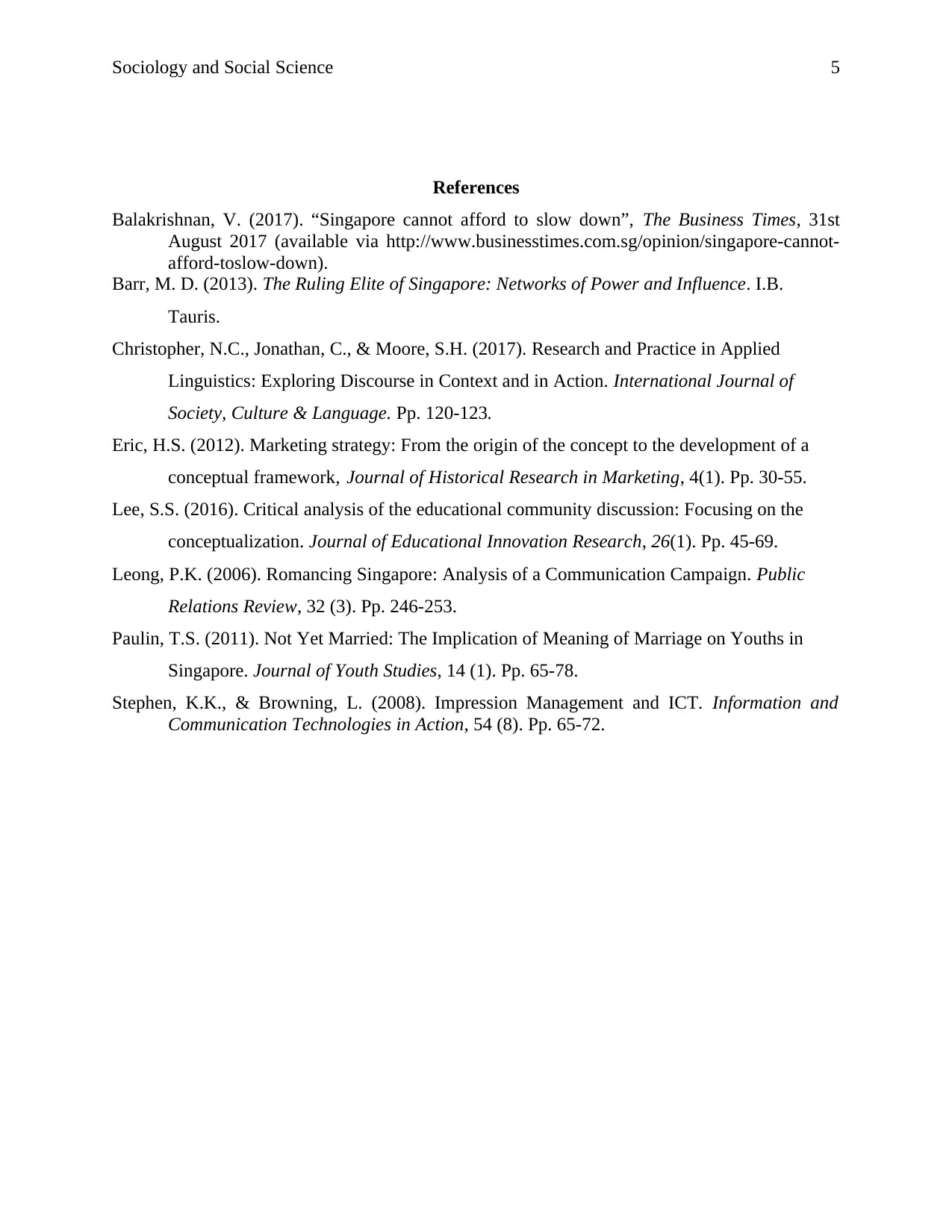
Sociology and Social Science 5
References
Balakrishnan, V. (2017). “Singapore cannot afford to slow down”, The Business Times, 31st
August 2017 (available via http://www.businesstimes.com.sg/opinion/singapore-cannot-
afford-toslow-down).
Barr, M. D. (2013). The Ruling Elite of Singapore: Networks of Power and Influence. I.B.
Tauris.
Christopher, N.C., Jonathan, C., & Moore, S.H. (2017). Research and Practice in Applied
Linguistics: Exploring Discourse in Context and in Action. International Journal of
Society, Culture & Language. Pp. 120-123.
Eric, H.S. (2012). Marketing strategy: From the origin of the concept to the development of a
conceptual framework, Journal of Historical Research in Marketing, 4(1). Pp. 30-55.
Lee, S.S. (2016). Critical analysis of the educational community discussion: Focusing on the
conceptualization. Journal of Educational Innovation Research, 26(1). Pp. 45-69.
Leong, P.K. (2006). Romancing Singapore: Analysis of a Communication Campaign. Public
Relations Review, 32 (3). Pp. 246-253.
Paulin, T.S. (2011). Not Yet Married: The Implication of Meaning of Marriage on Youths in
Singapore. Journal of Youth Studies, 14 (1). Pp. 65-78.
Stephen, K.K., & Browning, L. (2008). Impression Management and ICT. Information and
Communication Technologies in Action, 54 (8). Pp. 65-72.
References
Balakrishnan, V. (2017). “Singapore cannot afford to slow down”, The Business Times, 31st
August 2017 (available via http://www.businesstimes.com.sg/opinion/singapore-cannot-
afford-toslow-down).
Barr, M. D. (2013). The Ruling Elite of Singapore: Networks of Power and Influence. I.B.
Tauris.
Christopher, N.C., Jonathan, C., & Moore, S.H. (2017). Research and Practice in Applied
Linguistics: Exploring Discourse in Context and in Action. International Journal of
Society, Culture & Language. Pp. 120-123.
Eric, H.S. (2012). Marketing strategy: From the origin of the concept to the development of a
conceptual framework, Journal of Historical Research in Marketing, 4(1). Pp. 30-55.
Lee, S.S. (2016). Critical analysis of the educational community discussion: Focusing on the
conceptualization. Journal of Educational Innovation Research, 26(1). Pp. 45-69.
Leong, P.K. (2006). Romancing Singapore: Analysis of a Communication Campaign. Public
Relations Review, 32 (3). Pp. 246-253.
Paulin, T.S. (2011). Not Yet Married: The Implication of Meaning of Marriage on Youths in
Singapore. Journal of Youth Studies, 14 (1). Pp. 65-78.
Stephen, K.K., & Browning, L. (2008). Impression Management and ICT. Information and
Communication Technologies in Action, 54 (8). Pp. 65-72.
1 out of 5
Related Documents
Your All-in-One AI-Powered Toolkit for Academic Success.
+13062052269
info@desklib.com
Available 24*7 on WhatsApp / Email
![[object Object]](/_next/static/media/star-bottom.7253800d.svg)
Unlock your academic potential
Copyright © 2020–2026 A2Z Services. All Rights Reserved. Developed and managed by ZUCOL.





